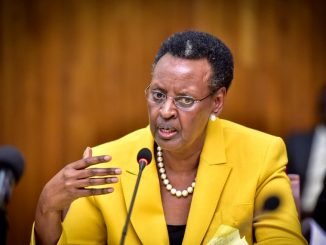
Kampala, Uganda | By Michael Wandati | The Ministry of Education has announced that laptops, smartphones, tablets, and other ICT devices will now be permitted in primary and secondary schools across Uganda. However, their use will be strictly regulated by school authorities to ensure a safe learning environment.
This policy shift was unveiled by Education Minister Janet Museveni on Thursday during the launch of the Education Digital Agenda, a framework designed to guide the integration of Information and Communication Technologies (ICTs) in the education system.
Minister Museveni acknowledged the significant benefits that ICTs and the internet can offer in enhancing education. However, she stressed the importance of implementing robust measures to prevent technology from becoming a source of distraction for students.
The Minister highlighted that while mobile devices will be allowed, they must be configured to block access to inappropriate and harmful content. All devices used in schools will need to meet the standards and conditions set by regulatory bodies like the National Information Technology Authority Uganda (NITA-U).
Museveni also pointed out that although schools will closely monitor school-provided devices to safeguard students’ cybersecurity, the Ministry cannot extend this regulation to devices used at home. She urged parents to be vigilant and proactive in ensuring their children’s online safety outside of school.
Historically, possession of mobile phones, tablets, and similar devices has been considered a serious violation in many schools, often leading to suspension for students found with such items.
Patrick Muinda, Assistant Commissioner of ICT at the Ministry of Education, noted that the decision to maintain certain restrictions is aimed at protecting learners in the digital space.
“We want to make sure that all devices used in schools are pre-configured to prevent any potential risks,” Muinda stated adding the ministry is currently finalizing guidelines on the use of ICT tools in education. While the exact details of these guidelines are still being developed, he confirmed that privately owned gadgets will not be permitted in schools,” said Muinda, also a member of the digital agenda team.
In 2022, certain schools, including Nakasero Secondary School, went against the prevailing policy by permitting students to bring smartphones to class. This was done to alleviate the shortage of ICT equipment and to aid in learning and research. However, this initiative was swiftly shut down by the Higher Education State Minister, Dr. John C. Muyingo.
Mason Naginda, a Senior Four student at Nabisunsa Secondary School, feels that the decision to allow smartphones in schools has been long overdue. She emphasizes that the new curriculum encourages students to take a more active role in their learning, and access to smartphones could significantly support this approach.
“At home, most of us have phones that we use for research and learning,” she said. “I’ve always wondered why access to these gadgets is restricted at school, especially when our ICT labs can’t accommodate all of us at once. Even the libraries are limited, but having a phone makes accessing information much easier.”
Mason Naginda, a Senior Four student at Nabisunsa Secondary School, praised the policy change allowing smartphones in schools but emphasized the importance of supporting students who cannot afford their own devices. She acknowledged the positive impact this shift could have on student-led learning, but cautioned that inclusivity must be a priority.
UNICEF Country Representative, Dr. Munir Safieldin, echoed these concerns, urging the government to go beyond the newly launched digital agenda documents and focus on effective implementation. He highlighted the need for infrastructure development and equipping schools nationwide to prevent any institution from being left behind.
Dr. Safieldin also stressed the importance of teacher training, noting that a 2022 e-readiness assessment revealed that 65% of teachers in both primary and secondary schools were uncomfortable with integrating technology into their teaching practices, preferring traditional methods instead.
To successfully implement the digital agenda, the Ministry of Education will require approximately 1.3 trillion shillings over the next seven years, translating to an estimated annual expenditure of 187.214 billion shillings.
Of this annual budget, 1.19 billion shillings will be allocated to the production of localized digital content, curriculum development, e-learning, and teacher training in technology-mediated teaching methods.
Also Read: Halt use of smartphones in schools, says minister Muyingo
An additional 185.9 billion shillings will be invested each year to improve access to digital services and connectivity infrastructure.
Uganda has faced numerous challenges in previous ICT education initiatives, many of which were unsuccessful. However, the COVID-19 pandemic, which forced the closure of traditional classrooms for over two years, accelerated the adoption of tech-driven learning, especially in private and urban schools.
This rapid transition exposed significant gaps, including a lack of clear policies and inadequate teacher training, prompting the Ministry to temporarily halt further development.
Despite these hurdles, the push towards digital education continued, leading to the formation of a team of experts tasked with developing a comprehensive Digital Agenda. This agenda is designed to guide the integration of ICT in classrooms and the overall teaching and learning process.
The introduction of the new lower secondary curriculum has further emphasized the need for mobile devices in schools, highlighting the critical role of student-led learning and research in the digital age.



